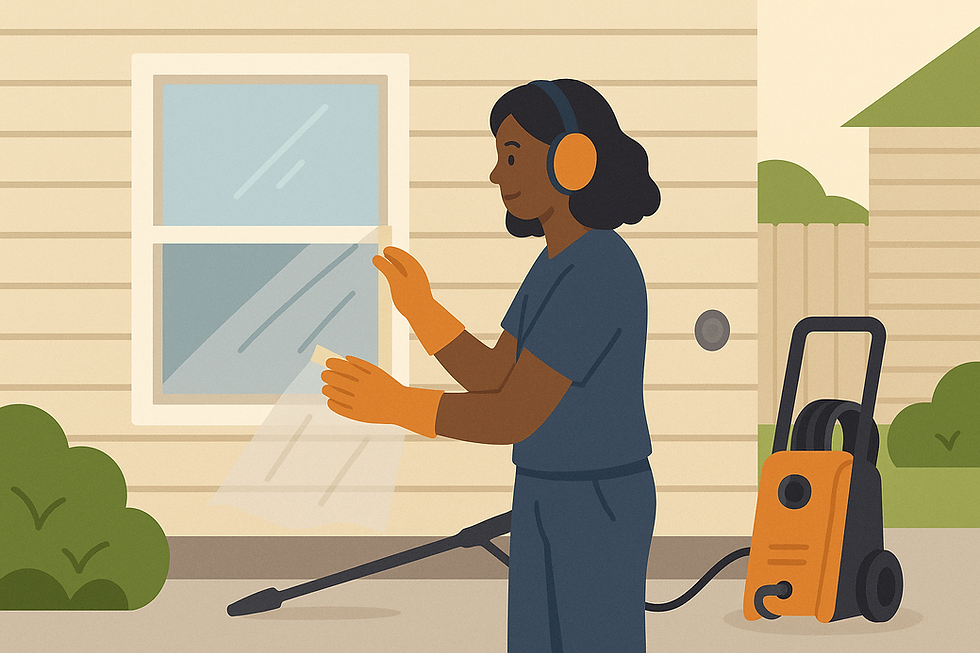Is Pressure Washing Environmentally Friendly?
- Jul 29, 2025
- 3 min read
Pressure washing is a powerful tool for maintaining the appearance of your home or business, quickly removing dirt, grime, mold, and stains from surfaces like siding, driveways, and decks. But with growing concerns about water conservation and pollution, many homeowners ask: Is pressure washing environmentally friendly?
The answer is—it can be. When done responsibly, pressure washing can be an eco-conscious cleaning method. However, without proper care, it also has the potential to harm the environment. Let’s take a closer look at the environmental impacts of pressure washing and how to make the process more sustainable.

The Environmental Concerns of Pressure Washing
1. Water Usage
Pressure washing uses significantly less water than traditional cleaning with a garden hose—on average, about 2 to 5 gallons per minute compared to 20 gallons per minute for a hose. However, larger jobs or prolonged use can still add up to hundreds of gallons of water.
In drought-prone areas or during water restrictions, excessive water use can be a concern. That said, pressure washers are generally more water-efficient than other cleaning methods when used properly.
2. Chemical Runoff
A bigger environmental issue is the use of harsh cleaning chemicals. Some pressure washing jobs require detergents to remove oil, mildew, or algae. If these chemicals wash into storm drains, they can flow untreated into rivers, lakes, or oceans, harming aquatic life and water quality.
Certain ingredients—such as phosphates or synthetic surfactants—can be particularly damaging. That's why it’s important to choose biodegradable, eco-friendly detergents when needed.
3. Soil and Plant Damage
The high pressure from a washer can dislodge soil, erode landscaping, and damage nearby plants. Additionally, runoff from cleaning chemicals can harm grass, flowers, and shrubs if not properly controlled or rinsed.
How Pressure Washing Can Be Eco-Friendly
When done with care and the right practices, pressure washing can actually be one of the greener cleaning methods available. Here's how:
1. Use Eco-Friendly Cleaners
Many modern pressure washing solutions are biodegradable and formulated to break down safely in the environment. Look for labels that say "non-toxic," "phosphate-free," or "biodegradable." These products are less likely to harm plants, animals, or water sources.
2. Capture and Filter Runoff
Professionals often use water reclamation systems that capture runoff water and filter out harmful substances before disposal. While not always practical for DIY jobs, even simple measures like redirecting water into grass or gravel areas can reduce runoff into storm drains.
3. Choose the Right Pressure
Using the appropriate pressure for each surface helps reduce water usage and limits the need for strong chemicals. For example, soft washing—using lower pressure with gentle cleaners—is safer for the environment and better for delicate surfaces like wood and roofing.
4. Limit Water Waste
Use only as much water as necessary and avoid letting the washer run idle. Target only the areas that need cleaning, and consider sweeping or pre-treating surfaces to minimize wash time.
When to Hire an Eco-Conscious Professional
If you're unsure about how to minimize your environmental impact, hiring a professional pressure washing service with green practices can be a smart move. Many companies now advertise eco-friendly services, using water recovery systems, safe detergents, and proper runoff management techniques to comply with local environmental regulations.
Final Thoughts
Pressure washing, like many tools, can be environmentally friendly—or not—depending on how it's used. While water consumption and chemical runoff are legitimate concerns, responsible practices can reduce the impact dramatically.
By using biodegradable cleaners, minimizing waste, and controlling runoff, homeowners and businesses can enjoy clean, beautiful surfaces without compromising their commitment to sustainability. Whether you're taking on a DIY project or hiring a pro, a little planning goes a long way toward making pressure washing both effective and environmentally responsible.
Want a cleaner home without harming the environment? Contact our eco-friendly pressure washing team today for safe, sustainable results you can feel good about.


